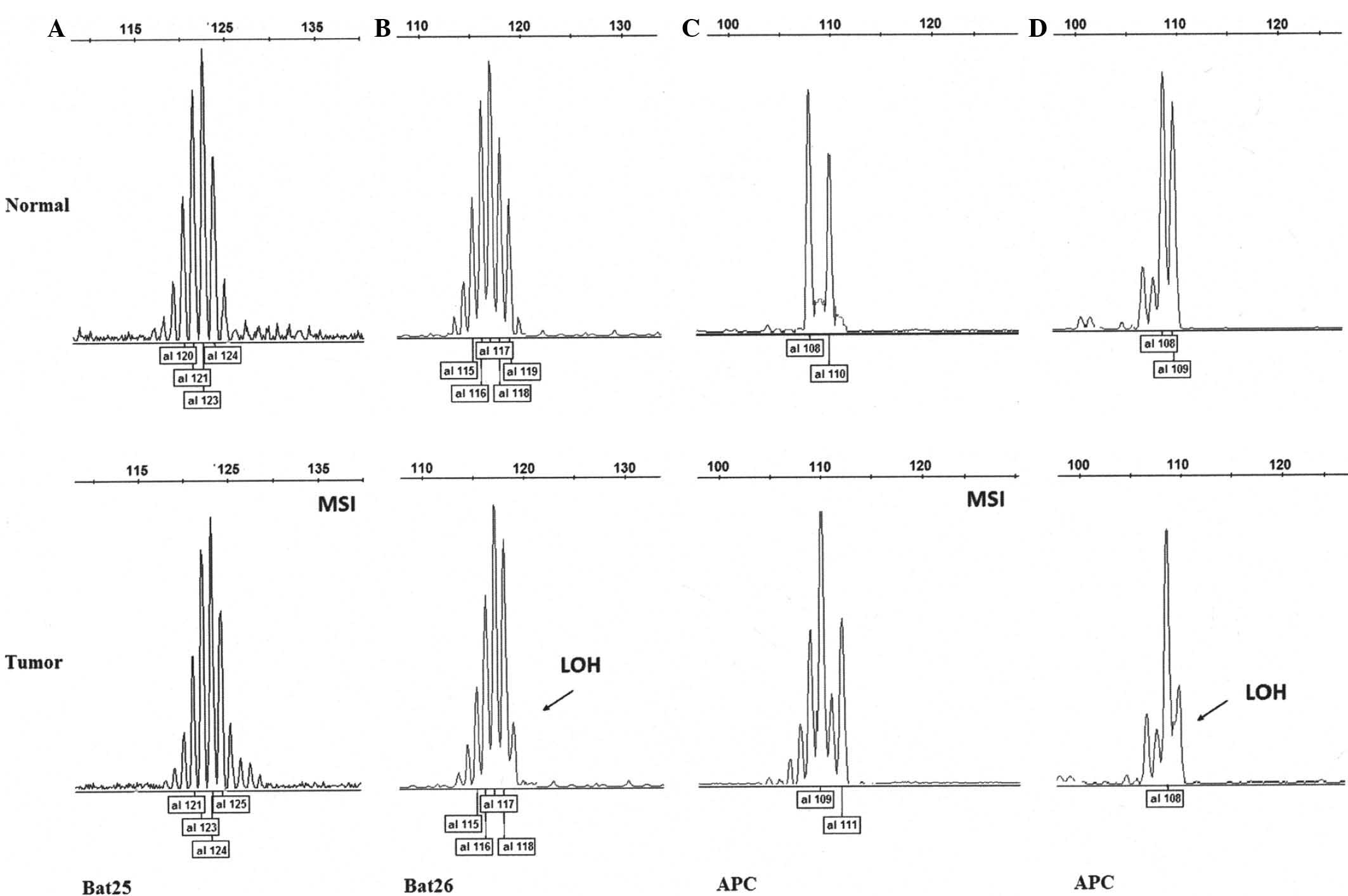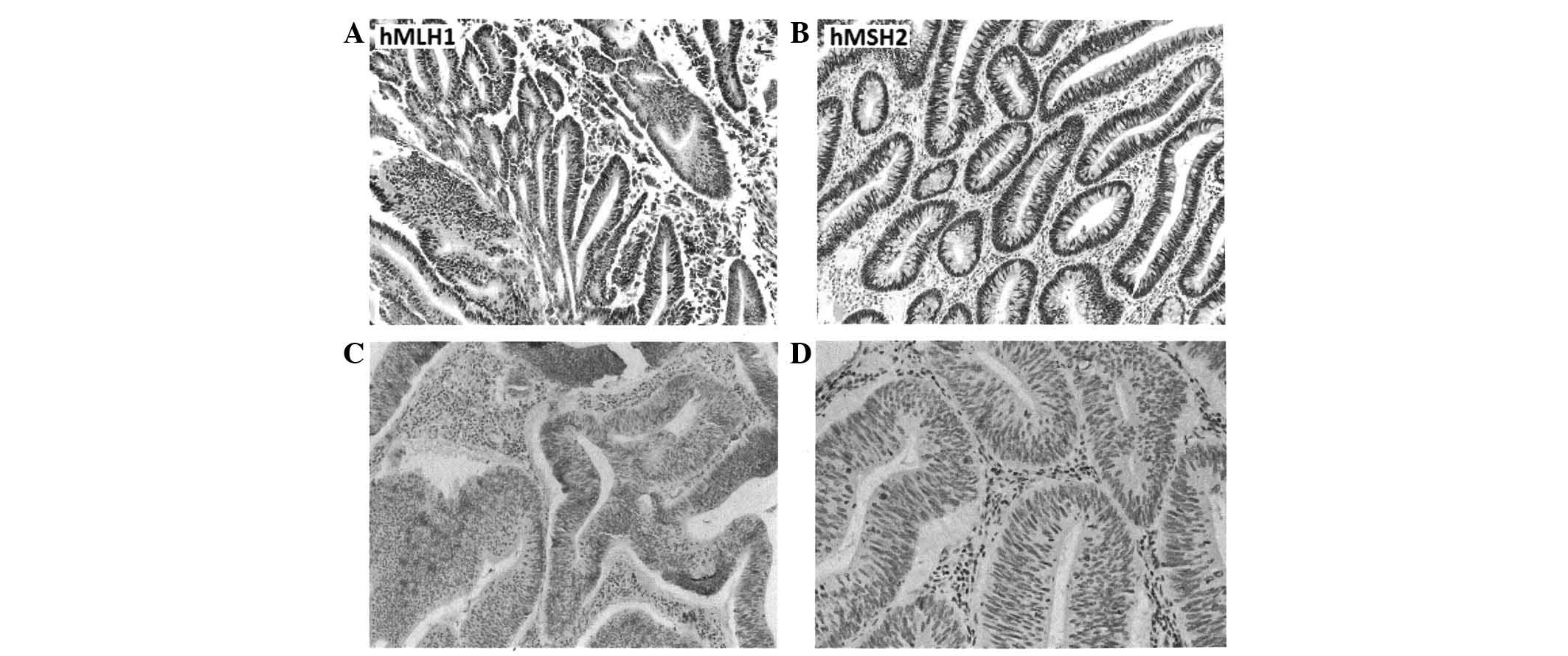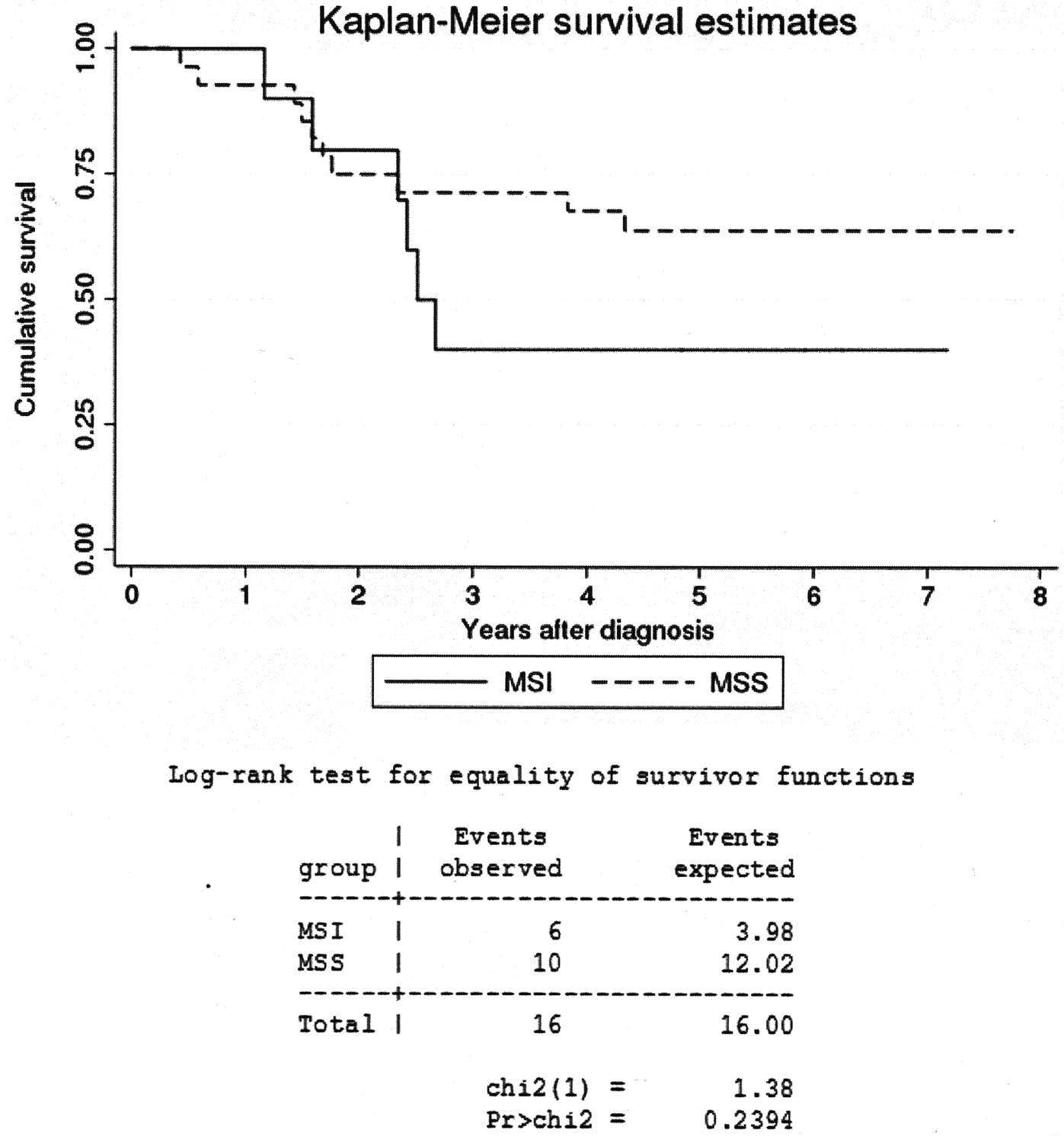|
1
|
Siegel R, Naishadham D and Jemal A: Cancer
statistics, 2012. CA Cancer J Clin. 62:10–29. 2012. View Article : Google Scholar
|
|
2
|
Mishra J, Drummond J, Quazi SH, et al:
Prospective of colon cancer treatments and scope for combinatorial
approach to enhanced cancer cell apoptosis. Crit Rev Oncol Hematol.
2013.PubMed/NCBI
|
|
3
|
Jemal A, Bray F, Center MM, Ferlay J, Ward
E and Forman D: Global cancer statistics. CA Cancer J Clin.
61:69–90. 2011. View Article : Google Scholar
|
|
4
|
Jasperson KW, Blazer KR, Lowstuter K and
Weitzel JN: Working through a diagnostic challenge: colonic
polyposis, Amsterdam criteria, and a mismatch repair mutation. Fam
Cancer. 7:281–285. 2008. View Article : Google Scholar : PubMed/NCBI
|
|
5
|
Sanchez JA, Krumroy L, Plummer S, et al:
Genetic and epigenetic classifications define clinical phenotypes
and determine patient outcomes in colorectal cancer. Br J Surg.
96:1196–1204. 2009. View
Article : Google Scholar
|
|
6
|
Saif MW and Chu E: Biology of colorectal
cancer. Cancer J. 16:196–201. 2010. View Article : Google Scholar
|
|
7
|
Fearon ER: Molecular genetics of
colorectal cancer. Annu Rev Pathol. 6:479–507. 2011. View Article : Google Scholar : PubMed/NCBI
|
|
8
|
Fearnhead NS, Wilding JL and Bodmer WF:
Genetics of colorectal cancer: hereditary aspects and overview of
colorectal tumorigenesis. Br Med Bull. 64:27–43. 2002. View Article : Google Scholar : PubMed/NCBI
|
|
9
|
Jass JR: Classification of colorectal
cancer based on correlation of clinical, morphological and
molecular features. Histopathology. 50:113–130. 2007. View Article : Google Scholar : PubMed/NCBI
|
|
10
|
Dahlin AM, Palmqvist R, Henriksson ML, et
al: The role of the CpG island methylator phenotype in colorectal
cancer prognosis depends on microsatellite instability screening
status. Clin Cancer Res. 16:1845–1855. 2010. View Article : Google Scholar : PubMed/NCBI
|
|
11
|
Bellizzi AM and Frankel WL: Colorectal
cancer due to deficiency in DNA mismatch repair function: a review.
Adv Anat Pathol. 16:405–417. 2009. View Article : Google Scholar : PubMed/NCBI
|
|
12
|
Sinicrope FA and Sargent DJ: Molecular
pathways: microsatellite instability in colorectal cancer:
prognostic, predictive, and therapeutic implications. Clin Cancer
Res. 18:1506–1512. 2012. View Article : Google Scholar
|
|
13
|
Cicek MS, Lindor NM, Gallinger S, et al:
Quality assessment and correlation of microsatellite instability
and immunohistochemical markers among population- and clinic-based
colorectal tumors results from the Colon Cancer Family Registry. J
Mol Diagn. 13:271–281. 2011. View Article : Google Scholar
|
|
14
|
Kaur G, Masoud A, Raihan N, Radzi M,
Khamizar W and Kam LS: Mismatch repair genes expression defects
& association with clinicopathological characteristics in
colorectal carcinoma. Indian J Med Res. 134:186–192. 2011.
|
|
15
|
Xavier CP, Lima CF, Rohde M and
Pereira-Wilson C: Quercetin enhances 5-fluorouracil-induced
apoptosis in MSI colorectal cancer cells through p53 modulation.
Cancer Chemother Pharmacol. 68:1449–1457. 2011. View Article : Google Scholar : PubMed/NCBI
|
|
16
|
Fehringer G, Boyd NF, Knight JA, et al:
Family-based genetic association study of insulin-like growth
factor I microsatellite markers and premenopausal breast cancer
risk. Breast Cancer Res Treat. 118:415–424. 2009. View Article : Google Scholar : PubMed/NCBI
|
|
17
|
Leite M, Corso G, Sousa S, et al: MSI
phenotype and MMR alterations in familial and sporadic gastric
cancer. Int J Cancer. 128:1606–1613. 2010. View Article : Google Scholar : PubMed/NCBI
|
|
18
|
Boland CR, Thibodeau SN, Hamilton SR, et
al: A National Cancer Institute Workshop on Microsatellite
Instability for cancer detection and familial predisposition:
development of international criteria for the determination of
microsatellite instability in colorectal cancer. Cancer Res.
58:5248–5257. 1998.
|
|
19
|
Evaluations of Genomic Applications in
Practice and Prevention (EGAPP) Working Group. Recommendations from
the EGAPP Working Group: genetic testing strategies in newly
diagnosed individuals with colorectal cancer aimed at reducing
morbidity and mortality from Lynch syndrome in relatives. Genet
Med. 11:35–41. 2009. View Article : Google Scholar
|
|
20
|
Chang SC, Lin JK, Lin TC and Liang WY:
Loss of heterozygosity: an independent prognostic factor of
colorectal cancer. World J Gastroenterol. 11:778–784. 2005.
View Article : Google Scholar : PubMed/NCBI
|
|
21
|
Migliore L, Migheli F, Spisni R and
Coppede F: Genetics, cytogenetics, and epigenetics of colorectal
cancer. J Biomed Biotechnol. 2011:7923622011. View Article : Google Scholar : PubMed/NCBI
|
|
22
|
Ashktorab H, Brim H, Al-Riyami M, et al:
Sporadic colon cancer: mismatch repair immunohistochemistry and
microsatellite instability in Omani subjects. Dig Dis Sci.
53:2723–2731. 2008. View Article : Google Scholar : PubMed/NCBI
|
|
23
|
Dietmaier W, Wallinger S, Bocker T,
Kullmann F, Fishel R and Rüschoff J: Diagnostic microsatellite
instability: definition and correlation with mismatch repair
protein expression. Cancer Res. 57:4749–4756. 1997.PubMed/NCBI
|
|
24
|
Castagnaro A, Marangio E, Verduri A, et
al: Microsatellite analysis of induced sputum DNA in patients with
lung cancer in heavy smokers and in healthy subjects. Exp Lung Res.
33:289–301. 2007. View Article : Google Scholar : PubMed/NCBI
|
|
25
|
Green MR, Jardine P, Wood P, et al: A new
method to detect loss of heterozygosity using cohort heterozygosity
comparisons. BMC Cancer. 10:1952010. View Article : Google Scholar : PubMed/NCBI
|
|
26
|
Powierska-Czarny J, Miścicka-Sliwka D,
Czarny J, et al: Analysis of microsatellite instability and loss of
heterozygosity in breast cancer with the use of a well
characterized multiplex system. Acta Biochim Pol. 50:1195–1203.
2003.
|
|
27
|
Agresti A: Categorical Data Analysis. 2nd
edition. Wiley; Hoboken, NJ: 2002, View Article : Google Scholar
|
|
28
|
Vilar E and Gruber SB: Microsatellite
instability in colorectal cancer-the stable evidence. Nat Rev Clin
Oncol. 7:153–162. 2010. View Article : Google Scholar : PubMed/NCBI
|
|
29
|
Poynter JN, Haile RW, Siegmund KD, et al:
Colon Cancer Family Registry: Associations between smoking, alcohol
consumption, and colorectal cancer, overall and by tumor
microsatellite instability status. Cancer Epidemiol Biomarkers
Prev. 18:2745–2750. 2009. View Article : Google Scholar
|
|
30
|
Samowitz WS: Genetic and epigenetic
changes in colon cancer. Exp Mol Pathol. 85:64–67. 2008. View Article : Google Scholar : PubMed/NCBI
|
|
31
|
Samowitz WS, Albertsen H, Herrick J, et
al: Evaluation of a large, population-based sample supports a CpG
island methylator phenotype in colon cancer. Gastroenterology.
129:837–845. 2005. View Article : Google Scholar : PubMed/NCBI
|
|
32
|
Imai K and Yamamoto H: Carcinogenesis and
microsatellite instability: the interrelationship between genetics
and epigenetics. Carcinogenesis. 29:673–680. 2008. View Article : Google Scholar : PubMed/NCBI
|
|
33
|
Hile SE, Wang X, Lee MY and Eckert KA:
Beyond translesion synthesis: polymerase κ fidelity as a potential
determinant of microsatellite stability. Nucleic Acids Res.
40:1636–1647. 2012.
|
|
34
|
Deschoolmeester V, Baay M, Wuyts W, et al:
Detection of microsatellite instability in colorectal cancer using
an alternative multiplex assay of quasi-monomorphic mononucleotide
markers. J Mol Diagn. 10:154–159. 2008. View Article : Google Scholar
|
|
35
|
Sasikumar R, Rejitha JR, Binumon PK and
Manoj M: Role of heterozygous APC mutation in niche succession and
initiation of colorectal cancer - a computational study. PLoS One.
6:e227202011. View Article : Google Scholar : PubMed/NCBI
|
|
36
|
Peng DF, Kanai Y, Sawada M, et al: DNA
methylation of multiple tumor-related genes in association with
overexpression of DNA methyltransferase 1 (DNMT1) during multistage
carcinogenesis of the pancreas. Carcinogenesis. 27:1160–1168. 2006.
View Article : Google Scholar : PubMed/NCBI
|
|
37
|
Feng Q, Hawes SE, Stern JE, et al: DNA
methylation in tumor and matched normal tissues from non-small cell
lung cancer patients. Cancer Epidemiol Biomarkers Prev. 17:645–654.
2008. View Article : Google Scholar : PubMed/NCBI
|
|
38
|
Burn J, Mathers J and Bishop DT: Genetics,
inheritance and strategies for prevention in populations at high
risk of colorectal cancer (CRC). Recent Results Cancer Res.
191:157–183. 2013. View Article : Google Scholar : PubMed/NCBI
|
|
39
|
Emery J, Lucassen A and Murphy M: Common
hereditary cancers and implications for primary care. Lancet.
358:56–63. 2001. View Article : Google Scholar : PubMed/NCBI
|

















